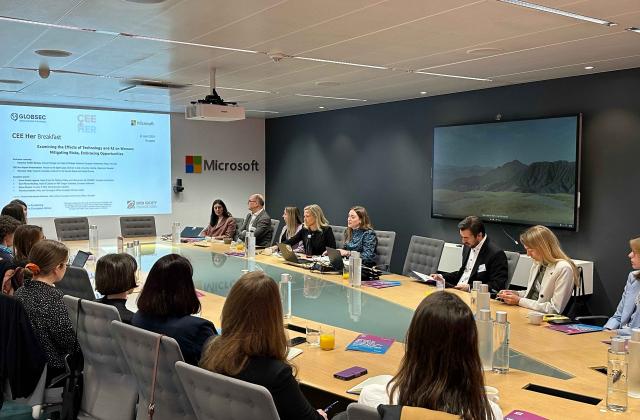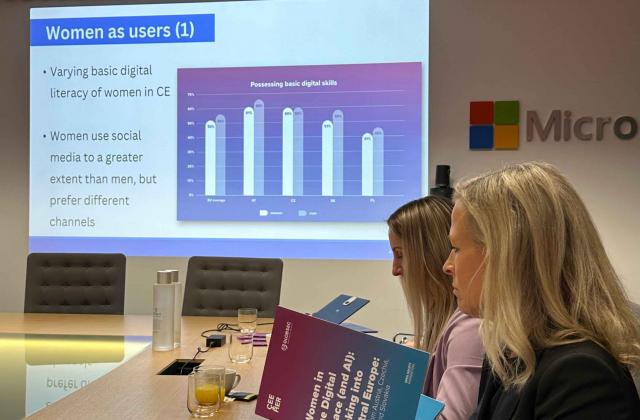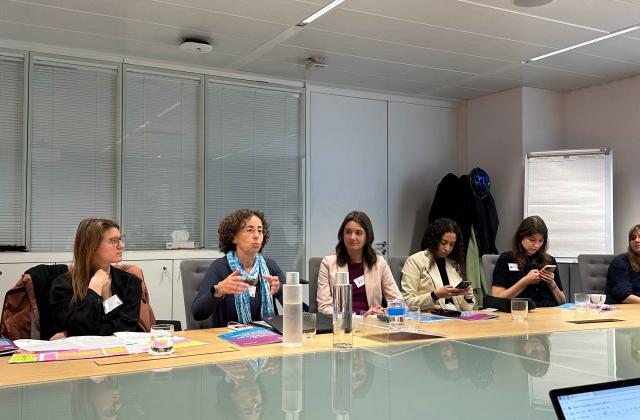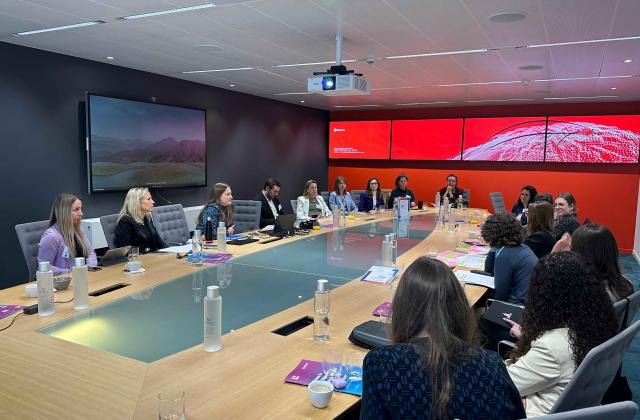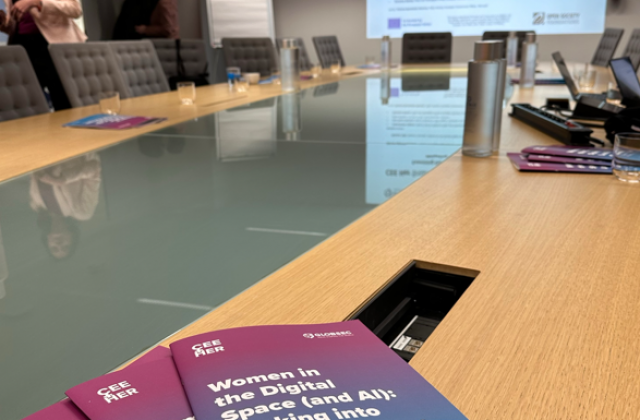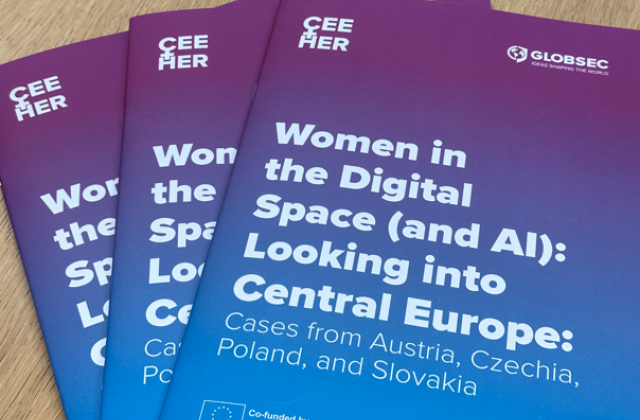CEE Her Breakfast in Brussels: The Effects of Technology and AI on Women
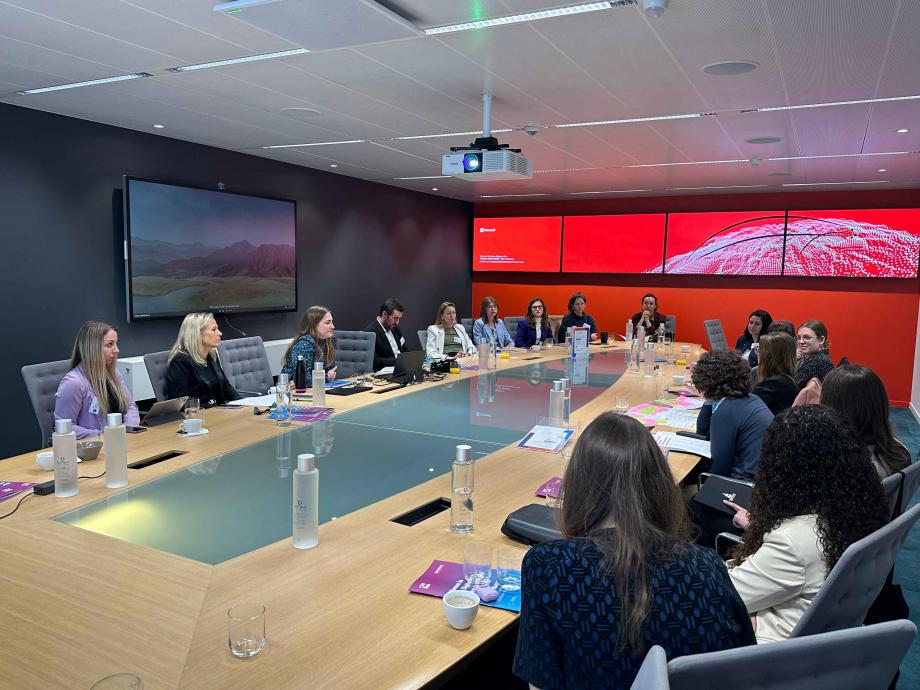
On 11 April, GLOBSEC and Microsoft Brussels co-organized a new edition of the CEE Her Breakfast in Brussels, Belgium. The roundtable discussion, titled “Examining the Effects of Technology and AI on Women: Mitigating Risks, Embracing Opportunities”, was part of a three-day CEE Her Workshop. The event featured the launch of GLOBSEC’s newest report: “Women in the digital space (and AI): A look at Austria, Czechia, Poland and Slovakia”.
Today, with new tech and the exponential availability of AI tools, an abundance of opportunities for women exists from easing their daily lives to supporting their career growth. Simultaneously, potential risks linger as well from personal safety to entrenchment of biases. The discussion at the Microsoft Center Brussels, moderated by Victoria Sarmiento Herrero, Microsoft’s Policy Advisor for European Government Affairs, focused on the following questions and beyond:
- With the EU asserting itself as a global standards setter in digital space and AI regulation, can European citizens, especially women, feel protected and empowered?
- How to find the balance between innovative progress, prosperity and security?
- Are we prepared for tackling serious threats to security and democracy with new tech tools?
- How to ensure that women can embrace opportunities but are not left behind exposed to serious risks from biases to gender-based violence in new forms?
The Breakfast kicked off with a presentation of the key findings from the Women in Digital Space (and AI) report provided by its lead author and Research Associate at the Institute for the Danube Region and Central Europe, Malwina Talik. Some of the important points learned during the presentation included:
- Although the digital literacy varies greatly across the region, women benefit from the digital solutions much below their potential.
- Gendered cyberviolence remains one of the most daunting challenges for women as digital users, which often stops them from expressing their views or using certain platforms.
- Female experts in the IT and AI fields are highly underrepresented, mainly due to lack of women with the necessary skills to enter the digital field. This can be explained by existing stereotypes about women’s career choices and too few visible role models.
- To bring change, we need to address the challenges in education systems, cultural perceptions, the gender pay gap.
Following the presentation, Katarina Wallin Bureau, General Manager and Head of Strategic Relations for European Government Affairs at Microsoft Center Brussels discussed the readiness to help mitigate the digital risks, such as deepfakes, which might affect the upcoming European Parliament elections. In general, addressing online threats is crucial not only for the gender equality but also for protecting modern democracy.
Irene Roche Laguna, Head of Unit for Platforms Policy and Enforcement at DG CONNECT presented the European Commission’s current agenda related to the gender equality in the digital space. With the AI act and Digital Services Act, the European Union is working towards eliminating digital threats, malicious influence of the generative AI, online gender-based violence, etc. There is still a lot of work to be done but the first joint steps of the European institutions are being taken.
Dan-Flaviu Nechita, Head of Cabinet for MEP Dragos Tudorache at the European Parliament talked about the role of women in the AI and how to make the field safer for female users. His recommendations included:
- put more effective measures in addition to labeling AI-generated content,
- pivot the resources at the EU level and taking the conversations to the governmental level,
- redirect a certain amount of work to law enforcement offices, especially for criminalized acts,
- promote role models for young women professional (ex. Brussels Binders),
- involve more men as women’s allies.
Further remarks were introduced by Sana Afouaiz, Founder & CEO of the Womenpreneur Initiative. As a young female professional herself, Ms. Afouaiz recognizes the importance of women training in technology and entrepreneurship and – even more importantly – raising awareness. Long-term support and the right mindset from early age are key. Concrete action should be included in the organization’s budget securing a long-term perspective to address the gender equality not only in numeric quotas but also in the type of work women perform (ex. hiring female engineers and managers, not only as HR or marketing specialists).
The panel was concluded with the remarks by Veronica Zaboia, Policy and Campaigns Officer at the European Women’s Lobby. She stressed the importance of legislative work and directives addressing violence against women online (cyberthreats, cyberstalking, hate speech, etc). The more advanced the technology is, the more invasive it becomes thus requires more safeguards. According to WEF Global Risks Report 2024, 95% of deepfakes are of sexual content, 90% of those specifically target women. To address the threats and recognize the victims, we need to involve more stakeholders, including tech companies and law enforcement authorities.
You can read the full report here.
